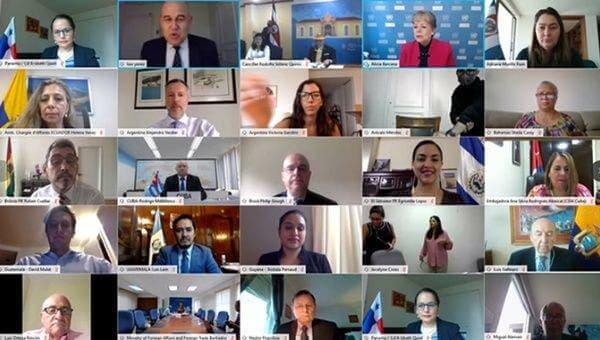Representatives of the member states from the Economic Commission for Latin America and the Caribbean (ECLAC) met via video-conference on Tuesday for the 35th session of the Commission’s Committee of the Whole. During the meeting, the 37 member countries and six associate members discussed ushering in a transformation in international financing that would allow member-states to respond effectively to the coronavirus pandemic while still ensuring sustainable development in the region at large.
At the same time, Costa Rica passed the baton for the Presidency of the organization to Cuba, which now begins its two-year term. The meeting was, in fact, co-chaired by the Cuban Minister of Foreign Trade and Foreign Investment Rodrigo Malmierca and ECLAC Executive Secretary Alicia Bárcena. During the meeting, Malmierca emphasized that Cuba is committed to a renewed push for multilateralism as part of the organization’s 2030 agenda, the need for which has been further accelerated by the economic damage wrought by the coronavirus pandemic and crippling US sanctions.
Malmierca called for regional coordination and cooperation on a number of fronts, saying, “The central value of our presidency was to further, through frank and open dialogue, the goals of putting an end to poverty and achieving zero hunger, where each person would have access to universal health services and each child would have access to an education system that contributes to closing the profound existing gaps that entrench inequality and foster a culture of privilege.”
Similarly, ECLAC’s Bárcena highlighted the indispensable role of ‘collective cooperation’ and international financial institutions in managing the region’s post-coronavirus recovery. She stressed that this recovery must be grounded in principles of equality, and financial and environmental sustainability. She also emphasized that such measures must be guided by fiscal stimulus packages rather than austerity measures, adding that efficient taxation systems must work to eliminate tax evasion so as to maximize government revenues that can then be directed towards recovery efforts.
Likewise, Costa Rican Minister of Foreign Affairs and Worship Rodolfo Solano, who is now ECLAC’s new Chair, underscored that the region, which has recorded over 5 million cases and more than 200,000 deaths, can only mitigate the worst effects of the pandemic by “working together” and “leaving no one behind”.
Meanwhile, Venezuelan Vice President of Planning Ricardo Menendez remarked that Venezuela’s recovery efforts are being impeded by the fact that its funds in overseas accounts are being blocked, which he referred to as an ‘act of terrorism’.
In a joint report by the World Health Organization and ECLAC, it was projected that the coronavirus crisis could “set back Latin America and the Caribbean by a decade”, with poverty expected to rise by 7% or an additional 45 million people and unemployment predicted to rise by 18 million to 44 million. The report also says that the region’s economy could contract by as much as 9.1%.
Latin American and Caribbean Countries Meet to Discuss Post-Covid Recovery
The member-states stressed upon coordination and ensuring sustainable development.
August 5, 2020

IMAGE SOURCE: ECLACECLAC representatives meet via videoconference
